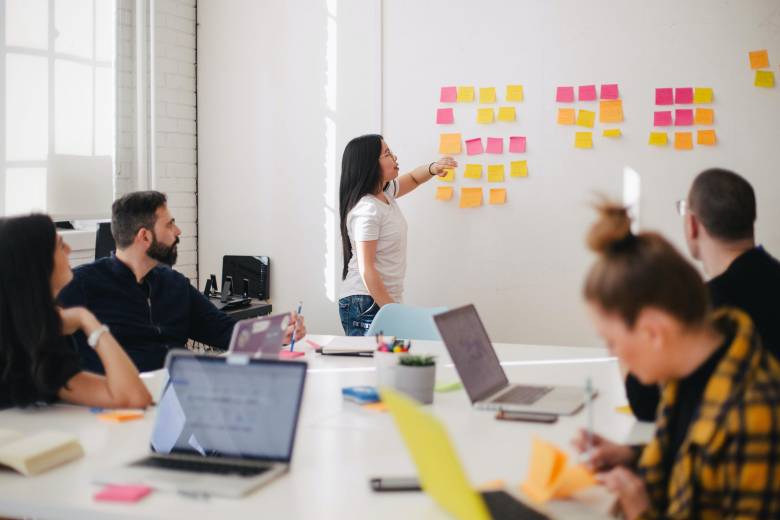
Projects showcase future of virtual learning
Nine initiatives led by OCAD University faculty and staff received $1.4 million in funding last June from eCampusOntario’s Virtual Learning Strategy (VLS) to develop the future of virtual learning for studio-based art, design and digital media education.
Last month, project teams across the University completed their research, further advancing OCAD U’s record of bringing innovative technology to emerging artists, designers and cultural workers and imbuing students with the skills to thrive in an ever-evolving marketplace. Learn more about some of the ambitious projects below.
Creating shared exhibition spaces in accessible online environments
WebXR Studios for Collaboration, Exhibition and Critique provides free and open-source project templates for staging and showcasing digital artwork in an Extended Reality (XR) space. Especially useful in the extensive and physically disparate contexts of remote learning, the browser-based XR environment scan be used as a gallery and critique space for students’ studio assignments. These spaces can be easily navigated through keyboard and mice, as well as with VR headsets.
The project, the development of which has been led by Judith Doyle, Associate Professor in the Faculty of Art and Chair of First-Year Experience, offers immersive AR/VR presentation spaces for a range of digital media. WebXR enables powerful approaches to online, hybrid and blended modes of studio art delivery. Its open-source nature makes the application even more beneficial to users.
Research for the project was partially undertaken within the first year Faculty of Art course, Form and Time, at OCAD U. Students in the course were supported by the WebXR Project Team to create customized galleries to display photogrammetric 3D objects, video and sound. Their culminating projects can be viewed online.
Ensuring Indigenous Knowledges are accessible to English Language Learners
Arriving at Indigenous Knowledges: Decolonial Approaches for English Language Learners (ELL) is a five-part online asynchronous course and Educators’ Guide for domestic and international ELL students entering or currently enrolled in Ontario post-secondary institutions. The course supports and advances students’ knowledge of Canadian and Indigenous contexts and histories and will be available via the VLS Collection in 2022.
Led by Phoebe Wang, Writing and Learning Consultant (ELL) in the Writing and Learning Centre at OCAD University, the online course contains approximately 50 hours of pages, presentations, recorded interviews and activities developed by Natasha Holmes as Project Manager, Michelle Majeed as Instructional Designer, Sanam Bahavar as ELL specialist and an Advisory Team consisting of subject matter experts.
The project also contains resources for instructors and faculty to develop decolonial and anti-racist practices when teaching Canadian and Indigenous histories, contemporary issues, literatures, visual art, art history and design. Student-facing staff and services are also encouraged to integrate this course in co-curricular programming for ELL students.
A virtual game that facilitates conversations about disabilities
Led by Dr. Lynne Heller, Adjunct Professor at OCAD U, Dobble Debate is a game that uses play and humour to help people talk and learn about disabilities. The beta version of the digital project is currently available online and was conceived, co-designed and co-created in partnership with a variety of community members who experience D/deafness and hardness of hearing, disability, differing abilities, autism and/or neurodiversity plus (DDDAND+).
While levity and exploration are key components of the game, human difference is not treated as a source of humour. Respect is a crucial aspect of Dobble Debate. The absurdity of situations presented in the game and the creativity of the discussion that they inspire promote laughter, connection and learning.
Originally conceived as an analogue game by scholars and students at Concordia University, the project was brought to OCAD U by artist and educator Nina Czegledy for further collaboration. This has resulted in Dobble Debate’s latest version, which is flexible, accessible and easily integrated into existing university courses to promote collaborative dialogue and interplay as thoughtful exchange.
The project site has been designed to assist both educators and students as they personalize gameplay to reflect their own interests and perspectives. Learning and growing, and taking pleasure in gaming, are of equal importance in the initiative.
Additional Virtual Learning Strategy projects
Digital Capacity Building
A multi-faceted initiative that will expand hybrid and online learning across all programs and transform OCAD U curriculum to enable greater access, interdisciplinarity and learner-directed movement through programs.
Project lead: Susan Ferguson, Director, Teaching and Learning
Entrepreneurship for Creatives Micro-credential Program
A digital certification that offers artists, designers and creatives the competencies and capabilities they need to bring their products and designs to market.
Project lead: Emily Krause, Managing Director, OCAD U CO
Intellectual Property Law for Creative Entrepreneurs Certificate
Stackable courses bringing the knowledge and application of intellectual property law to creative professionals.
Project Lead: Evan Tapper, Director, Continuing Studies
Learning to be Human Together
A toolkit of extensible resources to support humanizing learning.
Project lead: Dr. Jutta Treviranus, Director, Inclusive Design Research Centre; Professor, Faculty of Design
Hand Made: VR Tools for Creation
A partnership to develop Masterpiece Studios as a tool to reduce the barriers to creating in virtual reality while also co-designing the tool itself.
Project lead: Dr. Emma Westecott, Associate Professor, Faculty of Arts and Science
Social Media, Democracy and International Human Rights Mobilization
A new online Continuing Studies course designed to help students design pro-creative, pro-democratic responses to the repressions of authoritarian regimes. Project lead: Evan Tapper, Director, Continuing Studies